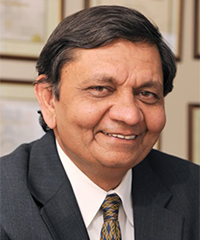Psychiatry
Major Depressive Disorder
Cognition Assessment in Elderly Patients With Depression
Overview
For elderly patients with major depressive disorder (MDD), the same set of principles for assessing cognition in depression should continue to apply. While highly prevalent dementing disorders, such as Alzheimer’s and vascular dementia, represent potentially overlapping phenotypes, these disorders should be considered in the differential diagnosis of MDD. Addressing cognitive impairment in older patients with depression entails addressing those factors that are modifiable. This includes treating patients to remission and preventing recurrence of the MDD, but also managing comorbidities such as diabetes, and looking for medical sources of cognitive impairment, including the effects of medications such as anticholinergics, benzodiazepines, and other non-benzodiazepine sedative/hypnotics. After all of these things are done – but not before – that is the point at which cognition can be measured, targeted, and treated.
Q: Let’s say you have an elderly patient with an established, life-long history of MDD who then seems to begin to develop dementia. Are there any special considerations in regard to cognition?
Roger McIntyre, MD
|
|
“When people hear cognitive dysfunction in depression, there is still this association, and they often think about dementing conditions.”
One of the points we really want to communicate clearly and without any ambiguity is that the impairment that we are talking about here (ie, cognitive impairment within depression) is very different from that of dementing disorders, such as Alzheimer’s disease, vascular dementia, and so on. When people hear cognitive dysfunction in depression, there is still this association, and they often think about dementing conditions.
Now, there is no question that people with MDD, especially if it is recurrent, are more susceptible to dementing disorders Certainly, we are talking about a phenotype that clearly overlaps but is very, very different. And that, I think, is a source of confusion for people.
Madhukar Trivedi, MD
|
|
My bias is that, when it comes to monitoring cognition related to depression in the elderly, I think that the same principles should continue to apply as related to the depression. Obviously, in the elderly the possibility of concomitant cognitive impairments associated with vascular events and with dementias is real, and that is something that should be developed further, as needed, in the differential diagnosis. But that doesn’t mean that elderly patients with depression would require different assessments for cognition in depression. There, I think, the deficits are the same: working memory, reaction time, etc. All need to be measured if we are going to make an impact.
Charles Debattista, MD
|
|
I agree. And at the same time, I think about what we know (especially for more chronically depressed elderly individuals as well as people with late-onset depression) and that is, standard treatments don’t seem to be as helpful to them. George Alexopoulos, MD, has considered what might be described as a depressed, executive dysfunction group (DED group) that really does not do well with serotonergic agents, in general. But it is also not clear that they do that well with stimulants, or modafinil or other strategies that have been attempted. So, patients in this group are challenging, and they are patients that can represent a “pharmacologic minefield,” because any medication we give in a compromised elderly individual can be problematic, causing a lot of mischief, which may not be so much of a problem in younger patients.
Ira D. Glick, MD
|
|
I definitely encounter patients who are older who have cognitive symptoms that don’t lift, and then I start wondering about dementia. The older they are, the more likely they are to get it. And obviously clinicians want to try to treat both, but there is no effective treatment for Alzheimer’s, while there are effective treatments for depression. But, in elderly people, especially people with dementia or Alzheimer’s disease, I would keep the antidepressant doses low, but then advance them to see what kind of response can be achieved. The other thing I’d say is that clinicians should not be “above” using electroconvulsive therapy (ECT).
Older folks tend to have a lot more medical problems, with longer medication lists, so you also have to be careful about concomitant medicines (eg, making sure that concomitant medicines aren’t undermining the treatment). I would go over the list, medication by medication, and see which ones are causing problems – notably anticholinergics, which patients are commonly on, can cause cognitive problems and problems with balance. A lot of the work I do as a sort of a “last resort psychiatrist” is to clean up medication regimens, and I try to give no more and no less than anybody needs. I make careful diagnoses, disorder-by-disorder, and then treat only what they need. And I am very anti-polypharmacy.
Dr McIntyre:
I agree with those comments. I’d say that when I approach someone who is elderly, the guiding principles would not be different, fundamentally, from someone who is 25 or 35 years old. There is obviously a differential diagnosis process that needs to take place.
Broadly, there are 2 categories of variables to consider: those that are modifiable and those that are not. So, clearly, age is not a modifiable factor, and age also clearly relates to cognitive performance. Things that can be modified include treating patients to remission and preventing recurrence, but also managing the comorbidity, the sleep disruption, removing treatments that are interfering with cognition (eg, anticholinergics, benzodiazepines, and other sedative/hypnotics), weight loss, diabetes control, thyroid control, and so on. And then, after we have done that, we are in a position to say, “This is the target, and in addition to having measurements, we should treat to the target.” And what is the target? In this case, it would be cognitive function, and we need to measure it. So I think the principles would be very similar.

References
Alexopoulos GS, Kiosses DN, Klimstra S, Kalayam B, Bruce ML. Clinical presentation of the “depression-executive dysfunction syndrome” of late life. Am J Geriatr Psychiatry. 2002;10(1):98-106.
Elsawy B, Higgins, KE. The geriatric assessment. Am Fam Physician. 2011;83(1):48-56.
Gansler DA, Suvak M, Arean P, et al. The role of executive dysfunction and dysexecutive behavior in late-life depression and disability. Am J Geriatr Psychiatry. 2015;23(10):1038-1045.
Montreal Cognitive Assessment. http://www.mocatest.org/. Accessed on July 4, 2017.














